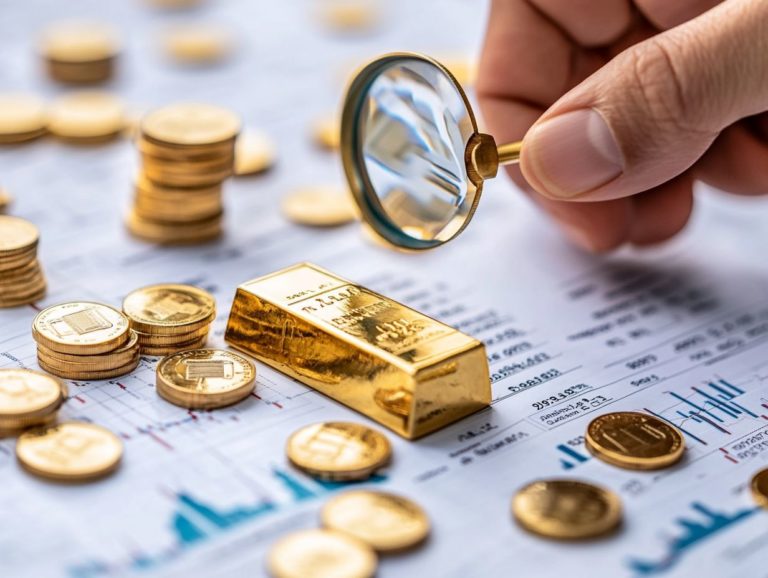The Best Times to Buy Gold: A Guide
Gold has long stood as a sanctuary for investors. Grasping the intricacies of the gold market is crucial for making informed choices.
In this guide, you will delve into the key factors that sway gold prices. You will also pinpoint the optimal moments to make your purchases. Various methods of acquisition and investment strategies will be examined, catering to those eager to fortify their financial future.
If physical gold doesn t align with your preferences, there s a range of alternative investment options that will also be explored.
Are you ready to explore the golden opportunities ahead? Let s begin!
Contents
- Key Takeaways:
- Unlocking the Secrets of the Gold Market
- When to Buy Gold
- How to Buy Gold
- Investing in Gold for the Long Term
- Alternatives to Buying Physical Gold
- Frequently Asked Questions
- What are the best times to buy gold?
- Is there a specific season or time of year that is best to buy gold?
- What factors influence the best times to buy gold?
- Do I need to monitor the market constantly to find the best times to buy gold?
- How can I determine if I am buying gold at a good price?
- Are there any risks associated with buying gold at certain times?
Key Takeaways:

- Buy gold during economic uncertainty for the best returns.
- Before purchasing gold, consider current market conditions and your financial goals.
- Long-term gold investments can enhance portfolio diversity and hedge against inflation; however, research and a strategy are essential.
Unlocking the Secrets of the Gold Market
Understanding the gold market requires analyzing the many factors that influence gold prices. These include geopolitical uncertainty, inflation, and market downturns.
As you shape your investment strategy whether aiming for short-term gains or long-term stability you ll find that gold serves as a crucial asset for portfolio diversification.
Influential figures like John R. Gilbert and Brandon Thor, along with reputable organizations such as the World Gold Council and Forbes, provide invaluable insights into market trends. These resources highlight gold’s role as a hedge against inflation and a method to capitalize on dollar strength.
Grasping this knowledge is vital for making informed decisions in your gold investments.
Factors Affecting Gold Prices
Several key factors influence gold prices, including interest rates, inflation, and geopolitical uncertainty. These can lead to considerable market fluctuations.
Interest rates are particularly crucial. When they rise, the potential earnings missed by holding non-yielding assets like bullion increases. As central banks raise interest rates, the appeal of gold tends to wane. Investors often shift their focus to interest-bearing investments, putting downward pressure on gold prices. During the 2015 to 2018 period, when the Federal Reserve gradually increased rates, gold experienced notable price corrections.
Geopolitical events can also affect prices. Conflicts or political instability can elevate fears and boost demand for gold as a safe haven. For instance, after the tensions in the Middle East in 2011, gold prices surged to record levels, demonstrating how crisis situations can dramatically influence market dynamics.
When to Buy Gold
Knowing when to purchase gold is essential for maximizing your investment returns. Understanding the optimal moments for buying involves keen analysis of gold prices and awareness of market downturns. This allows you to seize lucrative buying opportunities with precision.
Best Times to Purchase Gold

The optimal times to purchase gold typically align with market downturns or when gold prices are relatively low. This strategic approach allows you to acquire physical gold, gold ETFs, or other investment forms at advantageous rates.
When analyzing historical data, certain months consistently offer favorable opportunities for these purchases. For instance, March often shows a dip in demand after the holiday shopping spree of January. Meanwhile, August frequently witnesses investors liquidating assets prior to their summer vacations, making it a good time to consider the best time to buy silver.
September usually brings an uptick in buying activity in anticipation of the fall wedding season in various cultures. Similarly, December often sees a price drop as investors reassess their portfolios before the year’s end, making it an ideal month for discerning investors like you to dive in.
These patterns underscore the cyclical nature of gold prices and highlight the critical importance of timing in your investment strategy.
Don t wait start exploring your gold investment options now!
Factors to Consider Before Buying
Before purchasing gold, carefully consider important factors like current gold prices, the impact of rising interest rates, and the effectiveness of your investment strategy with a focus on spreading your investments across different assets.
Rising interest rates can make gold less appealing as they often drive investors towards interest-bearing assets. Align your gold purchases with long-term investment goals by understanding the best time to invest in precious metals to ensure they protect against market volatility rather than becoming a fleeting speculation.
Recognizing the benefits of spreading your investments is essential. Gold acts as a protective barrier during economic downturns. Incorporating gold into your investments can create a more balanced and resilient strategy that reduces the risks of market fluctuations.
How to Buy Gold
Choose between physical gold, like bars or coins, or gold ETFs. Each option has unique advantages tailored to your investment style.
Methods for Purchasing Gold
The main methods for buying gold involve acquiring physical gold whether in the form of gold bars or coins or investing in gold ETFs. ETFs allow you to gain exposure to gold prices without the hassle of physical storage.
When considering these options, weigh the tangible benefits of owning physical gold against the convenience of ETFs. Owning gold bars or coins requires practical considerations like secure storage, perhaps in a safe deposit box or a personal safe, and insurance against theft or damage.
On the other hand, gold ETFs usually carry lower fees and simplify the buying and selling process through brokerage accounts. Reflect on your individual investment goals and preferences, as these will significantly influence the best method for enhancing your portfolio.
Investing in Gold for the Long Term

Investing in gold for the long term offers numerous advantages. Gold is a powerful tool against inflation that can protect your wealth and enhance portfolio diversification, making it attractive for both short-term and long-term investors.
By incorporating gold into your investment strategy, you can navigate economic uncertainties while potentially reaping significant rewards.
Benefits and Strategies
Investing in gold provides many benefits. It serves as a solid hedge against inflation and has shown historical stability during market downturns. This can significantly enhance your portfolio diversification, especially if you’re a long-term investor.
Consider the 1970s, a decade marked by soaring inflation rates averaging 7.1%. Gold prices skyrocketed by approximately 2,300%, proving its ability to retain value when currencies falter. Similarly, during the 2008 financial crisis, gold prices surged by nearly 25%, establishing gold as a safe haven for cautious investors.
To include this precious metal in your portfolio, set a target allocation percentage usually recommended at around 5% to 10% of your overall investment portfolio. Using gold exchange-traded funds (ETFs) or incorporating physical gold can enhance liquidity and reduce risk.
This balanced approach opens the door to potential capital appreciation and acts as a buffer against losses during volatile market conditions.
Alternatives to Buying Physical Gold
If you’re exploring alternatives to purchasing physical gold, options like gold ETFs and other gold-related financial instruments are available. These alternatives offer enhanced liquidity and easier management, making them an appealing choice compared to the complexities of storing physical assets.
Other Ways to Invest in Gold
Exploring ways to invest in gold opens up a world of opportunities beyond just physical ownership. Consider gold exchange-traded funds (ETFs), mining stocks, and various gold-related financial instruments that allow you to engage with the gold market without the headaches of owning the metal itself.
Gold ETFs present a streamlined approach to gaining exposure to gold prices while keeping transaction costs lower than buying and storing physical gold bullion. You can easily buy and sell these exchange-traded funds on stock exchanges, making them both liquid and accessible.
Mining stocks enable you to tap into the potential of gold mining companies. Their stock performance often dances in rhythm with gold prices. This method not only offers leverage (the potential to increase returns based on the performance of underlying assets) but can also provide dividends, sweetening the pot for potential returns.
Don’t overlook diversified gold mutual funds, either. These funds pool resources to invest in a variety of gold-related assets, effectively spreading your risk. Each option you consider carries its own risk profile. While physical ownership is generally regarded as the safer bet for long-term value retention, ETFs and stocks might tempt you with higher volatility and the allure of greater returns. If you’re interested in the best places to buy physical gold, don’t wait too long to invest; the market can change quickly!
Frequently Asked Questions

What are the best times to buy gold?
The best times to buy gold are typically when the market is down and prices are low. This allows you to get the most gold for your money.
Is there a specific season or time of year that is best to buy gold?
There is no specific season or time of year that is considered the best time to buy gold. However, historically, gold prices tend to be lower during the summer months.
What factors influence the best times to buy gold?
The price of gold is influenced by various factors such as economic and political stability, inflation rates, and supply and demand. Understanding these factors can help determine the best times to buy gold.
Do I need to monitor the market constantly to find the best times to buy gold?
While keeping an eye on the market can be helpful, it is not necessary to constantly monitor it. Having a general understanding of market trends is important, but consult with a professional before making any large gold purchases.
How can I determine if I am buying gold at a good price?
One way to determine if you are getting a good price for gold is to compare current prices to historical prices. Research current market trends and consult with a reputable gold dealer.
Are there any risks associated with buying gold at certain times?
As with any investment, risks are involved. The best way to minimize these risks is to do your research and consult with a professional. It’s crucial to buy only from reputable dealers to ensure the authenticity of your gold.














